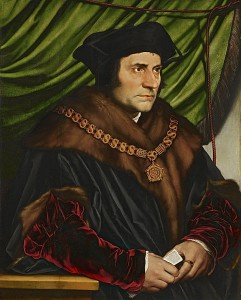 It is not known exactly when Sir Thomas More was born but it is thought to be 6th or 7th February 1477 or 1478. He was born in Milk Street, London, which now bears a plaque saying “Sir Thomas More was born in a house near this site 7 February 1478”. His parents were Sir John More, a lawyer and judge on the King’s Bench, and Agnes Graunger, daughter of Thomas Graunger, a merchant of the Staple of Calais and an Alderman of London.
It is not known exactly when Sir Thomas More was born but it is thought to be 6th or 7th February 1477 or 1478. He was born in Milk Street, London, which now bears a plaque saying “Sir Thomas More was born in a house near this site 7 February 1478”. His parents were Sir John More, a lawyer and judge on the King’s Bench, and Agnes Graunger, daughter of Thomas Graunger, a merchant of the Staple of Calais and an Alderman of London.
More joined the household of John Morton, Archbishop of Canterbury, before studying Latin and logic at the University of Oxford. He then studied law in London. It was while he was a student that he met and became friends with men like William Lilye, John Colet and Erasmus.
Between 1499 and 1503, More stayed at the Carthusian priory, London Charterhouse, while he considered joining the order. He also considered becoming a Franciscan monk, but decided to devote himself to the law after he realised that a life of celibacy did not suit him. More became a Member of Parliament in 1504, an Undersheriff of the City of London in 1510, a Master of Requests in 1514, one of the King’s counsellors in 1517 and then a Privy Councillor in 1518.
In 1521, Thomas More was knighted and made Undertreasurer after proving himself by carrying out a diplomatic mission to Charles V with Cardinal Wolsey. He rose in influence as the King’s personal secretary and adviser, became Speaker of the House of Commons in 1523, and then the High Steward of the Universities of Oxford and Cambridge. He was appointed the Chancellor of the Duchy of Lancaster in 1525. In 1529, More was made Lord Chancellor after the fall of Cardinal Thomas Wolsey.
More supported the Catholic Church, which he saw as the true faith, and campaigned against the Reformation and heresy. His actions against the Reformation included helping Cardinal Wolsey to prevent the importation of Lutheran books into England, producing scholarly works against Luther’s writings and persecuting people whom he perceived as heretics. His non-religious scholarly work included “History of King Richard III” and “Utopia”.
He was a loyal servant of King Henry VIII, but ended up being executed as a traitor on 6th July 1535 after refusing to take the Oath of Succession. He believed that “no temporal man may be the head of spirituality”, even his beloved King.
More is famous as St Thomas More, after being beatified in 1886 and canonised in 1935. His feast day is celebrated on 22nd June in the Roman Catholic Church and 6th July in the Anglican Church.
(Based on an extract from “On This Day in Tudor History” by Claire Ridgway)